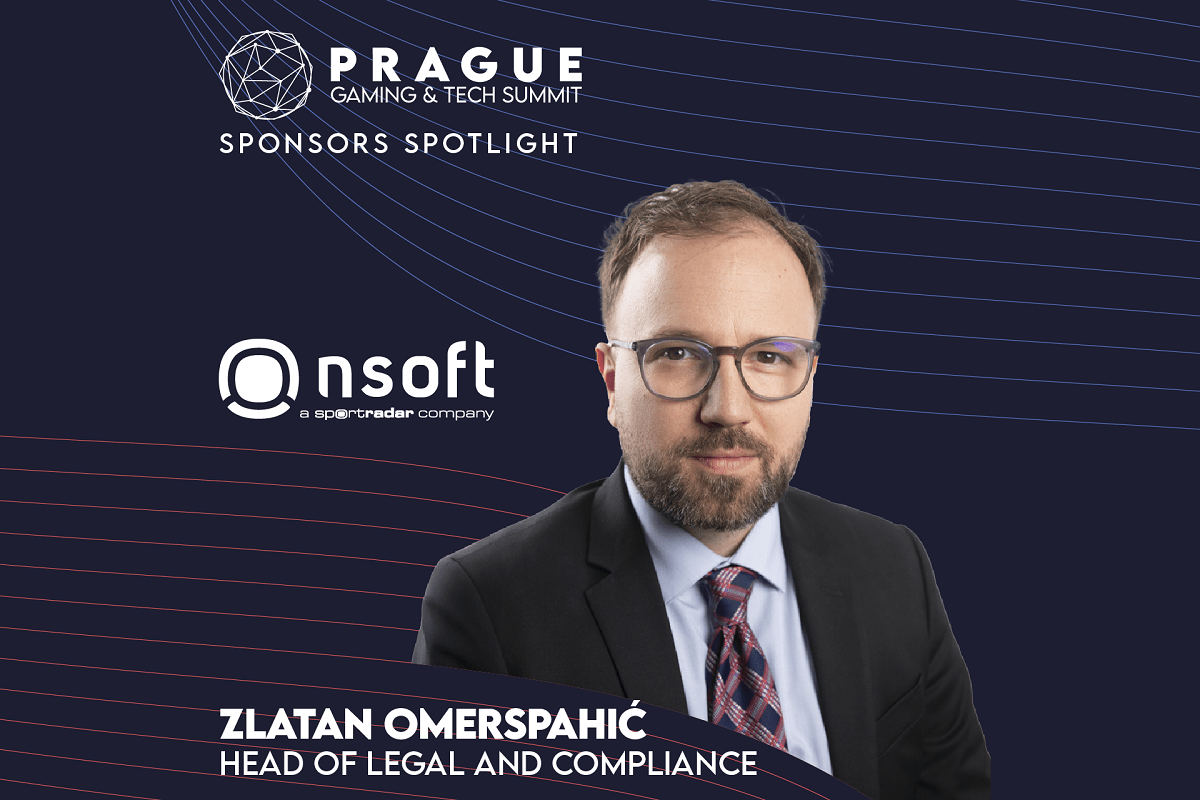
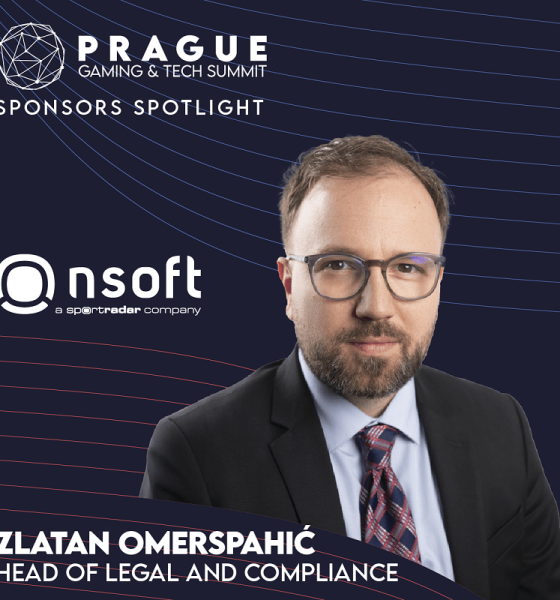
Conferences in Europe
Navigating Compliance & Innovation: NSoft’s Vision for iGaming’s Future
HIPTHER, organizer of the Prague Gaming & TECH Summit 2025, is proud to welcome NSoft, an awarded software provider in the betting and gaming industry, as a key participant in this year’s event. In this exclusive interview, we speak with Zlatan Omerspahić, Head of Legal and Compliance at NSoft, to explore the challenges of entering the Brazilian market, the company’s new slot development plans, and the latest updates on its Next Gen Platform and Sportsbook solutions.
As new markets emerge, compliance requirements continue to evolve. What are the biggest regulatory challenges NSoft faces when certifying its portfolio for international expansion, and how do you navigate them?
When facing a new regulatory framework or amendments, one of the main challenges is determining how to adapt your existing portfolio. On the one hand, you need to comply with regulations; on the other, you must remain attractive to players.
Each market typically has its own set of technical standards. Some European jurisdictions require Random Number Generator (RNG) certification from specific labs. Different U.S. states mandate unique reporting formats for game logs or jackpot payouts.
The modular architecture allows us to develop games and platforms that can be easily adapted or toggled on/off for specific features required by different regulators. Our dedicated compliance team tracks each market’s technical updates. We have established an internal process to quickly evaluate and implement changes and we work closely with accredited labs (e.g., GLI, BMM) that have experience across multiple jurisdictions. Early and regular testing in these labs can speed up certification.
The biggest challenge lies in anticipating all necessary steps so that both you and your client have a clear understanding of the time to market. Securing licenses can be expensive and time-consuming.
Some markets, like the UK, have strict guidelines under the UK Gambling Commission (UKGC). Others, such as Malta, follow the Malta Gaming Authority (MGA) requirements. The frameworks can vary significantly in scope. Separate licensing is often needed for each new product type (e.g., sports betting vs. online slots).
We start with smaller or simpler markets to fine-tune our processes before moving on to the bigger, more complex ones. We maintain a comprehensive library of corporate and technical documentation (policies, procedures, financial statements) so it can be adapted quickly for each new licensing application.
Different regions have different data privacy requirements. The General Data Protection Regulation (GDPR) in the EU requires strict controls on handling personal data, with hefty fines for noncompliance. Some markets have data localization rules (e.g., certain Latin American or Asian regions) requiring that customer data remain on local servers.
We integrate encryption, access controls, and clear data retention policies from the outset. Working with hosting and cloud providers who offer local data centers where required, ensures we meet data residency requirements. We maintain comprehensive privacy policies that clearly outline data usage, storage, and protection mechanisms.
iGaming operators are prime targets for illicit money flows because of high-volume transactions. Regulators impose strict AML (Anti-Money Laundering) and KYC (Know Your Customer) requirements, including identity verification, transaction monitoring, and suspicious activity reporting.
What to do here? Integrate robust KYC and AML software that automatically flags unusual betting patterns or rapid deposit/withdrawal cycles. Tailor AML protocols to match the specific risk profiles of each jurisdiction. High-risk areas might require enhanced due diligence measures.
Each regulation has its own requirements, and regulatory bodies lack a uniform approach, so there is no single stance on the matter. Fortunately, thanks to my team of experienced professionals who have been in the industry for many years, we can quickly adjust to whatever these regulations entail.
The Brazilian market is currently undergoing significant regulatory changes. From a compliance perspective, what are the key hurdles for suppliers entering this market, and how is NSoft ensuring full adherence to local requirements?
Brazil has undoubtedly been the most important topic in the industry over the past few months. As part of the Sportradar Group, we have big plans for this market and are excited about the opportunities it offers.
From a regulatory standpoint, Brazil is a textbook example of a market transitioning from unregulated to regulated status for the first time. It naturally creates uncertainty and complexity for suppliers entering the market.
The challenges we encountered are interpreting new and evolving legislation around sports betting, online gaming, and taxation, each of which may require different licenses or technical approvals. We also faced regulatory changes during the certification process, which prolonged our time to market.
Also, data protection rules under Brazil’s LGPD mirror GDPR in some respects but introduce distinct obligations, such as potential data localization or particular reporting guidelines. In parallel, suppliers must adapt to local financial and banking processes to fulfill AML and KYC requirements, which can differ significantly from those in North America or Europe.
Through close collaboration with leading certification bodies, we worked diligently to meet all requirements.
Thanks to the dedicated efforts of our development team, we managed to overcome these challenges. However, there is a sense that the regulatory framework may need further adjustments after some time, once the newly regulated environment begins functioning in practice.
NSoft has been expanding its casino portfolio, particularly in slot development. How do compliance and regulatory standards shape the innovation process, and what are the biggest challenges when launching new video slots?
Balancing innovation and regulation is always challenging. While development focuses on creating the highest-quality product tailored to players’ preferences, regulation aims to protect players through a framework that covers various aspects.
We face a range of challenges, from game design and RTP percentages specific to certain markets to acceptable game names and mechanics.
In highly regulated jurisdictions, for example, a new slot might need to limit the maximum bet, include automatic loss or time-limits, or remove potentially addictive features such as rapid-fire spins.
The biggest challenge lies in balancing innovation with meeting these stringent regulations. Each game feature, like bonus rounds, progressive jackpots, or social elements, must be tested and certified by third-party labs, adding time and cost to the development cycle. Additionally, different markets might impose unique conditions on how results are displayed or how player data is stored.
What sets us apart, however, is our adaptability. We have in-house solutions for everything we offer, which makes the adaptation process significantly faster.
Your Next Gen Sportsbook Platform is built with a strong punter-centric approach. How does regulatory compliance play a role in platform development, and what steps does NSoft take to ensure both operators and players benefit from a secure and compliant environment?
Regulatory compliance is a cornerstone of NSoft’s Next Gen Sportsbook Platform, ensuring that both operators and players benefit from a secure, fair, and legally compliant environment.
Given the ever-evolving nature of global betting regulations, NSoft integrates compliance into every stage of platform development. NSoft’s platform is designed to meet the strictest regulatory requirements across various markets, supporting compliance with multiple gambling authorities, including the MGA, UKGC, and local regulators, to facilitate seamless licensing and adherence to legal frameworks.
As a speaker at the Prague Gaming & TECH Summit, what key insights will you be sharing with the audience? What makes this event an essential platform for discussing the intersection of compliance, innovation, and market expansion?
At the Prague Gaming & TECH Summit, I will share key insights into the evolving regulatory landscape, the role of technology in compliance, and how innovation drives sustainable market expansion. My primary focus will be on the Balkan countries.
This event is crucial for networking with regulators and industry leaders, giving direct insights into what’s next in compliance, technology, and market growth. It’s the perfect platform for staying ahead of regulatory challenges and finding practical solutions.
With NSoft at the Prague Gaming & TECH Summit 2025, this year’s event promises invaluable insights into the future of iGaming and technology. Don’t miss the opportunity to connect with industry leaders, gain exclusive market perspectives, and be part of the most dynamic gathering in the CEE region!
Join us on 25-26 March 2025 in Prague – Register now and explore the full agenda!
The post Navigating Compliance & Innovation: NSoft’s Vision for iGaming’s Future appeared first on European Gaming Industry News.
Conferences in Europe
Speaking the Player’s Language: Promatic Group’s Take on Game Localization in CEE
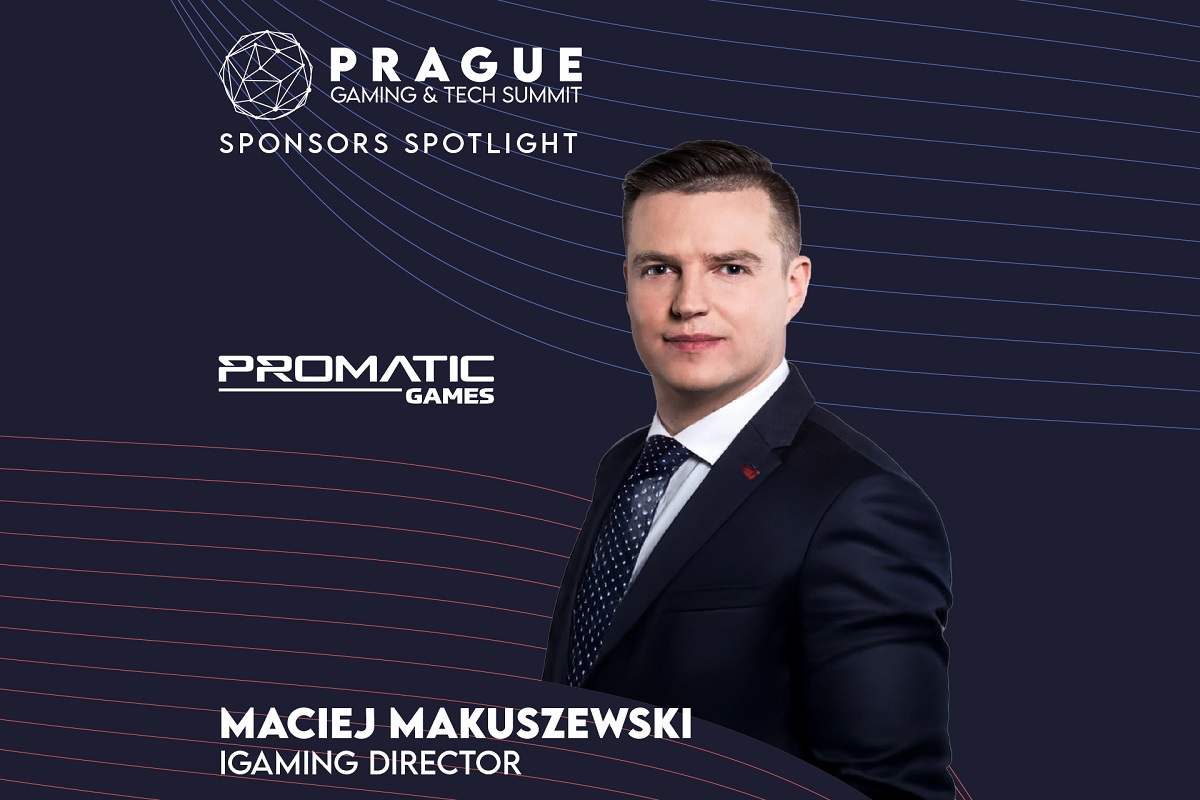
The Prague Gaming & TECH Summit 2025 brought together some of the brightest minds in the iGaming and tech industries – and the conversation didn’t stop when the curtains closed. As this year’s General Sponsor through its Promatic Games brand, Promatic Group made a powerful impact on-stage and behind the scenes. In a dynamic keynote presentation titled “Localizing Slot Games: Does the Central European Player Need Localized Content?”, Maciej Makuszewski, iGaming Director, and Luka Oblak, Head of Product Design, explored how cultural nuances shape player engagement and game performance across regional markets.
Now, post-event, we caught up with Maciej Makuszewski to delve deeper into the topic of localization, player behavior, and what makes content truly resonate in Central and Eastern Europe.
Maciej, your keynote at the Summit offered compelling insights into how culture and language affect game engagement. What do you believe is the biggest misconception about localization in the iGaming industry today?
It is that it is enough to hire a translator of a game to deliver localized content. This is not the end of the road – on the contrary – this is just the beginning. This may sound like saying the sun rises in the east, but I still would say there can be a lot more attention paid to giving games a local touch.
But coming back to translations, nowadays, even at this basic level, we can observe so many pitfalls and mistakes that could have been avoided if people really had the player at the core of their strategy. I guess we are past this time in history of globalization that unified products and content simply entered new markets with no tailoring whatsoever and there was demand for them, because there hadn’t been much of a choice of anything else. We’d like to see companies try harder when they enter new markets. I hope we will become one that actually gets the hyperlocalization just right.
You and Luka presented some standout cases on localized content. Could you share one example that truly surprised your team – either by outperforming expectations or revealing a cultural insight you hadn’t anticipated?
I guess that would be the transformation of a simple fruit game launched as Red Hot Jackpot in Poland, into a rich animations theme game it became in Nigeria. The nigerian version of Red Hot Jackpot is called Naija Wheels and it is the exact the same math model and game logic as Red Hot Jackpot, but what makes it appealing to the local customers of slot halls in Nigeria is its hyperlocal theme. Naija Wheels is a funny story of things you see in Lagos traffic. So instead of a Cherry symbol you have a symbol of a police officer. Instead of a plum symbol, you have an okada driver from Lagos etc.
Very different game themes, same logics, same business effects – the game is a great performing slot in Poland and a superb hit in Nigeria.
In your view, what are the non-negotiables when designing localized slot content for Central and Eastern European markets? Are there elements developers often overlook?
There are so many local markets in the CEE that it is really hard to unify this. But in a nutshell – we know in our region, highly volatile fruit themed games are very popular. Having said that, it is not a surfire way to success. You may want to localize the content even further through cultural and humor references.
The ROI of local-branded slots is often debated. Based on Promatic Group’s experience, when does it make strategic and commercial sense to invest in hyper-local content – and when is it better to focus on broader appeal?
It all depends why you do this and how you measure the ROI. If you measure a single game ROI this might be a trap. It will very much depend on the math model and features of the particular game. Apart from revenue stream, there are also costs to be considered. If we’re talking about a “game reskin” then certification will be something you can optimize and so on. There are numerous ways to tackle this issue. Sometimes you can come up with a hyper local game and just launch it somewhere else to test if it works, which will boost your revenue stream and the total ROI. All in all we are very happy with our local approach and we intend to stick to it.
Let’s talk about the future. With shifting player expectations and tech advancements like AI personalization, how do you see the localization strategy evolving over the next 2–3 years at Promatic Group?
I would expect this hyperlocalization becomes a commodity in the industry. This will also require a lot of human factor so that it is done the right way. AI will speed things up, but I believe that the human touch will be key. We already have amazing tools, but using them the right way is what will make a great difference.
The post Speaking the Player’s Language: Promatic Group’s Take on Game Localization in CEE appeared first on European Gaming Industry News.
Compliance Updates
Navigating Legal Frontiers: Nordic Legal’s Vision for the Finnish Gambling Market
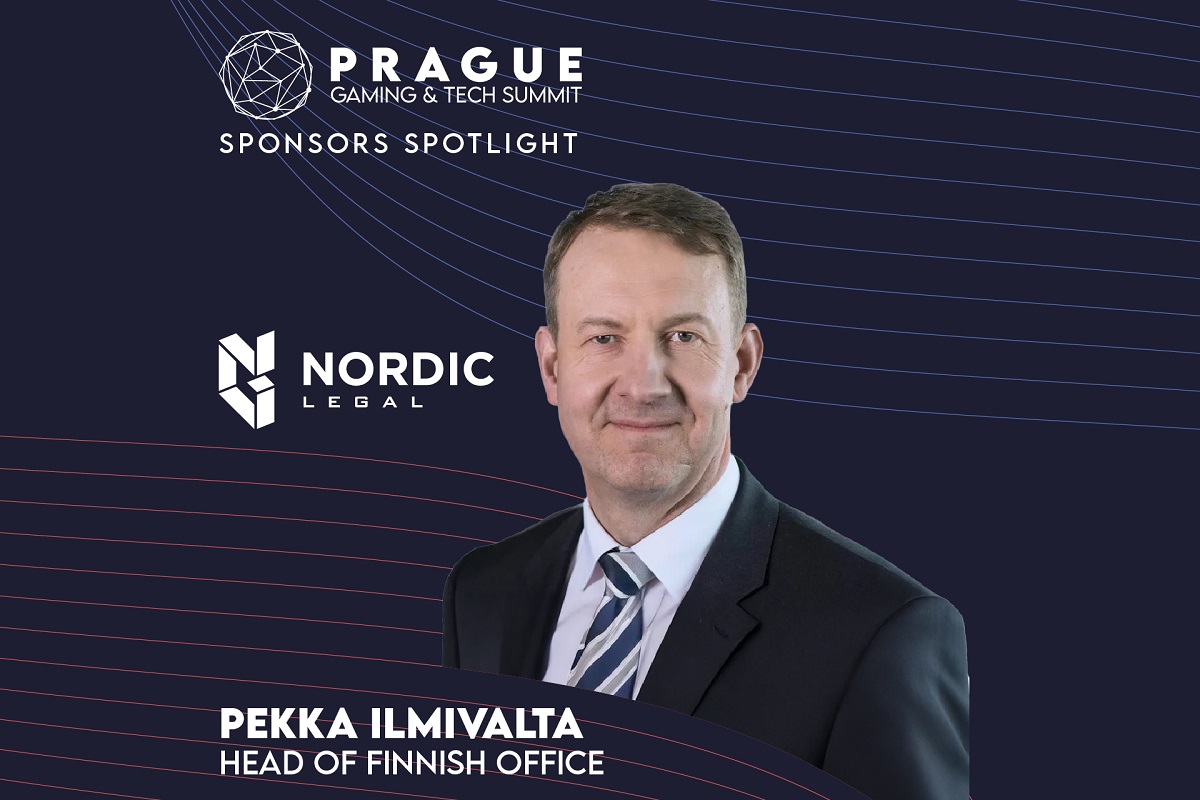
The Prague Gaming & TECH Summit 2025 brought together top experts across the iGaming and tech landscape, and Nordic Legal stood out as the event’s Scandinavian Legal Expertise Sponsor. A renowned legal advisory firm in the Nordic region, Nordic Legal continues to shape the future of gambling legislation and compliance in Europe.
In this post-event interview, we caught up with Pekka Ilmivalta, Head of the Finnish Office at Nordic Legal, to dive deeper into the firm’s insights on the upcoming Finnish gambling reform, the legal challenges it poses, and the opportunities it presents for operators preparing to enter the market.
Finland is preparing to launch its regulated gambling sector in January 2026. As an expert with over 20 years of experience in the gambling industry, how do you view its draft legislation and the current state of the Finnish gambling market?
Finns are used to gambling online, and the size of the market is close to 2 billion euros in GGR. As the market share of the national monopoly operator, Veikkaus, has declined to around 50 percent, nearly half of the gambling spending already takes place outside the Finnish regulation. Therefore, the gambling legislation reform is really needed.
The Government Proposal now being dealt with in the Finnish Parliament is generally a comprehensive and a good package. As the political parties are quite unanimous about the need for the reform, I expect the parliamentary discussion to concentrate on the balance between responsibility measures and the features making the market interesting enough for the operators to enter the regulated market. Especially marketing, use of affiliates and bonusing will, and should, be discussed.
I believe that the Parliament will approve the new legislation early next autumn and that the B2C license application process will be able to begin already in January next year.
The Finnish legislative review council has raised concerns about potential increases in gambling harms under the new regulatory framework. What measures do you believe are necessary to mitigate these risks, and how could Finland balance market liberalization with responsible gambling practices?
Personally, I think that gambling harms must be taken seriously. However, as almost half of the Finnish gambling now happens outside the regulated market, I am convinced that succeeding in channelization is a crucial starting point to really mitigate gambling harms. Therefore, attractiveness of the market and measures against the black market are extremely important. Furthermore, self-exclusion and responsible gambling tools are, of course, needed for the players. Generally, I believe that AI assisted monitoring could and will have an important role in preventing harmful gambling in the future. To really work, responsible gambling tools need to be both pragmatic and relevant for each individual player.
Considering Finland’s upcoming gambling reform, what legal and operational challenges should gambling operators be prepared for, particularly regarding compliance and player protection? Which key trends do you see shaping the market’s future?
As it seems now that affiliates and welcome bonuses will be banned, operators will have to find other means to build their brand and acquire customers. Even though traditional marketing and sponsoring are widely acceptable, I would expect to see innovative solutions to stand out from the probable marketing avalanche during the first months after the market opening. Perhaps new kinds of sponsorships or retail activities? Or even enhanced player protection measures to gain a competitive edge?
Overall, I would advise operators to start their market entry preparations early enough. The licensing procedure could take several (6 to 9) months. Also, adjusting to the local technical and player protection requirements might not happen overnight.
What insights could help Finland create a balanced and effective gambling market?
I believe that the new legislation will provide a good enough framework for a functional gambling market. However, based on experiences from Sweden and Denmark, I would point out two practical aspects crucial to making the new legislation effective: First, there needs to be collaboration between licensed operators and the new regulator. Dialogue and a mutual will to find solutions should be the common mindset. Secondly, the regulator hopefully has enough resources (tools, persons and persistence) to interfere with the black-market operations, which will evidently still exist also after the reform.
Nordic Legal has extensive experience advising European governments on regulatory best practices. How can your firm assist operators looking to enter the Finnish market and navigate the evolving legal landscape?
With our deep knowledge of Finnish legislation, extensive experience from regulatory developments in other jurisdictions, and strong industry relationships, we are well-positioned to support operators and B2B suppliers entering the Finnish market. We can offer comprehensive guidance not only on compliance and licensing, but also on navigating strategic challenges, ensuring our clients are well-prepared for a dynamic and shifting legal landscape. Our proactive approach enables us to identify regulatory changes early and help clients stay ahead of industry developments.
The post Navigating Legal Frontiers: Nordic Legal’s Vision for the Finnish Gambling Market appeared first on European Gaming Industry News.
Conferences in Europe
ELA Games’ Yaroslav Soloshenko to Speak at the SBC Digital Conference 2025
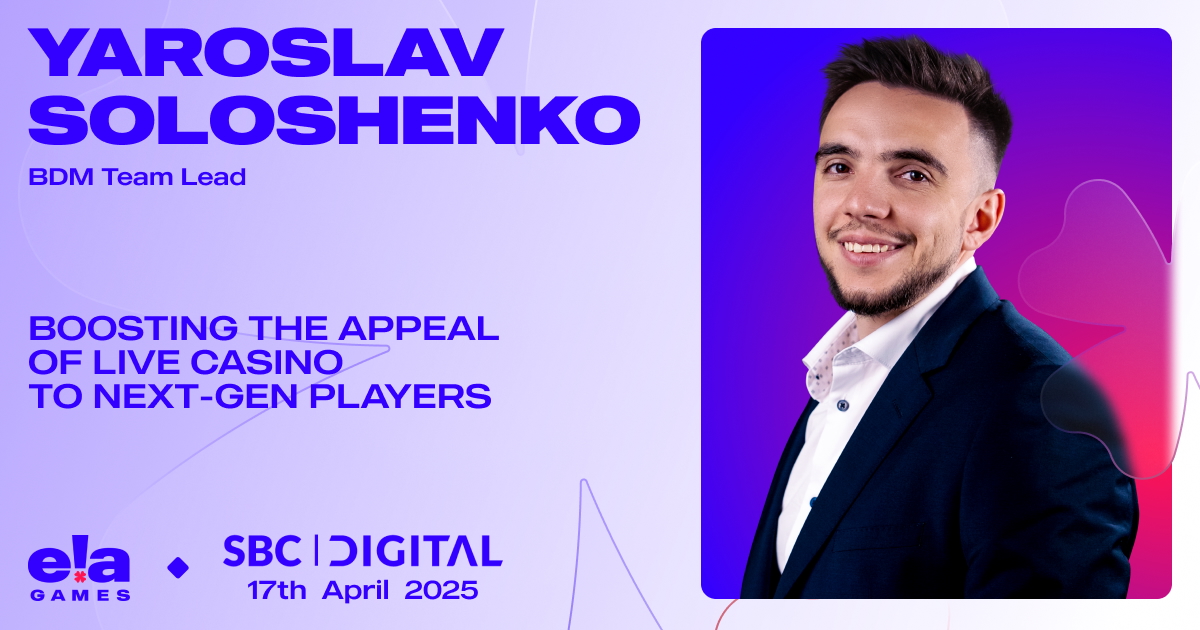
Yaroslav Soloshenko, ELA Games’ Business Development Team Lead, will participate in the panel discussion titled “Boosting the appeal of live casino to next-gen players” at the upcoming SBC Digital Conference 2025 on April 17, 2025.
The online full-day conference will gather the iGaming industry’s influential leaders to host in-depth conversations on the most relevant and talked-about topics in the online casino and slots space.
Yaroslav will be part of a three-person panel to discuss the future of online gaming and how live casino features can capture a modern audience. He will highlight how ELA Games’ titles, such as Cash Crab, have a crucial role in inspiring business success for operators with social gamification mechanics while providing a fresh gaming experience for players.
Yaroslav Soloshenko commented, “It’s a pleasure to represent ELA Games at the upcoming SBC Digital Conference, where I’ll join influential panelists to explore how live casino features can evolve to accommodate the next generation of gamers. Our studio has witnessed firsthand how games like Cash Crab, with real-time social and gamification mechanics, can help operators drive engagement and acquire new players in a competitive market. I’m excited to discuss this topic further and provide relevant insights for all attendees.”
The post ELA Games’ Yaroslav Soloshenko to Speak at the SBC Digital Conference 2025 appeared first on European Gaming Industry News.
-

 gaming3 years ago
gaming3 years agoODIN by 4Players: Immersive, state-of-the-art in-game audio launches into the next generation of gaming
-
EEG iGaming Directory8 years ago
iSoftBet continues to grow with new release Forest Mania
-
News7 years ago
Softbroke collaborates with Asia Live Tech for the expansion of the service line in the igaming market
-
News6 years ago
Super Bowl LIII: NFL Fans Can Bet on the #1 Sportsbook Review Site Betting-Super-Bowl.com, Providing Free Unbiased and Trusted News, Picks and Predictions
-
iGaming Industry7 years ago
Rick Meitzler appointed to the Indian Gaming Magazine Advisory Board for 2018
-
News6 years ago
REVEALED: Top eSports players set to earn $3.2 million in 2019
-
iGaming Industry7 years ago
French Senator raises Loot Boxes to France’s Gambling Regulator
-
News7 years ago
Exclusive Interview with Miklos Handa (Founder of the email marketing solutions, “MailMike.net”), speaker at Vienna International Gaming Expo 2018















